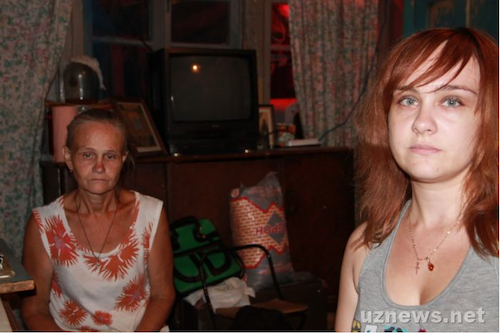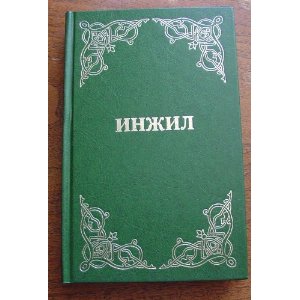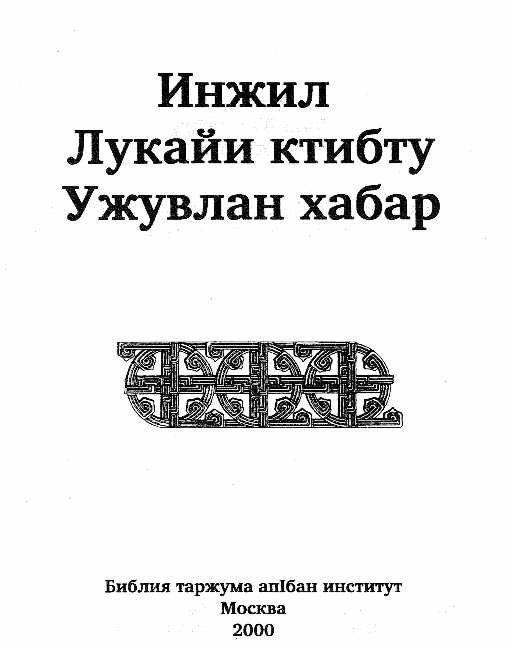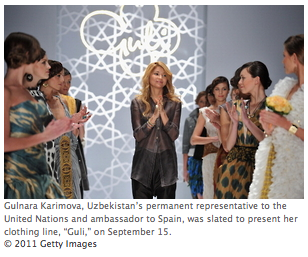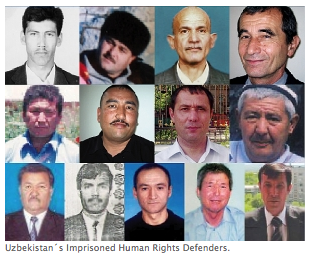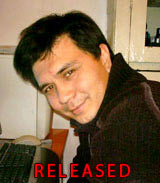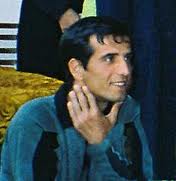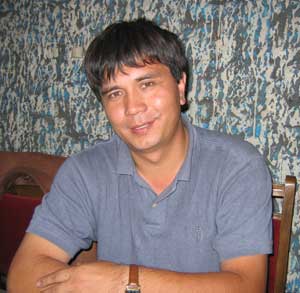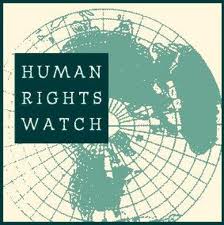 On June 9, 2011, the Supreme Court of Uzbekistan granted the Ministry of Justice's petition to liquidate Human Rights Watch's Tashkent office registration. The hearing was brought forward from a later date without notice and the court deliberated for only a few minutes before granting the petition. There is no appeal. The legal ruling follows years of Uzbek government obstruction of Human Rights Watch's access to the country, including through denial of visas and accreditation to Human Rights Watch staff, most recently researcher Steve Swerdlow in December 2010. This obstruction amounted to the effective expulsion of Human Rights Watch from Uzbekistan, which we announced in March.
On June 9, 2011, the Supreme Court of Uzbekistan granted the Ministry of Justice's petition to liquidate Human Rights Watch's Tashkent office registration. The hearing was brought forward from a later date without notice and the court deliberated for only a few minutes before granting the petition. There is no appeal. The legal ruling follows years of Uzbek government obstruction of Human Rights Watch's access to the country, including through denial of visas and accreditation to Human Rights Watch staff, most recently researcher Steve Swerdlow in December 2010. This obstruction amounted to the effective expulsion of Human Rights Watch from Uzbekistan, which we announced in March.
The Uzbek government continues its interference with independent civil society and its harassment of activists. Uzbekistan's international partners should make clear such interference and harassment are unacceptable, and impose concrete policy consequences for the government's continued failure to uphold the rights to association, assembly, and expression, and for its atrocious human rights record in general.
--------
(London) - The Uzbek government has forced Human Rights Watch to close its Uzbekistan office, Human Rights Watch said today. For years the government has obstructed the organization's work by denying visas and work accreditation to staff, and has now moved to liquidate its office registration, forcing Human Rights Watch to end its presence in Tashkent after 15 years.
"With the expulsion of Human Rights Watch, the Uzbek government sends a clear message that it isn't willing to tolerate critical scrutiny of its human rights record," said Kenneth Roth, executive director of Human Rights Watch. "But let me be clear, too: we aren't going to be silenced by this. We are as committed as ever to report on abuses in Uzbekistan."
On March 10, 2011, Human Rights Watch received information from the Supreme Court of Uzbekistan that the Justice Ministry had moved to liquidate the organization's office in Tashkent, with a first hearing apparently set for March 15. Human Rights Watch has been registered in Uzbekistan since 1996. Uzbek authorities have provided no information about the alleged grounds for the liquidation proceeding.
The Uzbek government had previously denied work accreditation to Human Rights Watch's Uzbekistan researcher, Steve Swerdlow, a decision conveyed in a letter handed to him by the Justice Ministry on Christmas Eve 2010. The letter states that the Ministry denied accreditation to Swerdlow because of Human Rights Watch's "established practice" of "ignoring Uzbekistan's national legislation" and because Swerdlow "lacks experience cooperating with Uzbekistan" and "working in the region as a whole." The letter does not specify what laws Human Rights Watch allegedly violated.
"Uzbek government claims that we ignore Uzbek legislation and ‘lack experience in the region' have been used repeatedly to deny accreditation to our staff," Roth said. "These claims are implausible and a transparently deceitful pretext to prevent us from maintaining a presence in the country."
Since 2004, the Uzbek government has interfered with the work of Human Rights Watch by denying or severely delaying visas and/or accreditation to every Human Rights Watch representative in Tashkent, and even threatened criminal charges against one staff member. The government has made it impossible for the organization to maintain a regular presence in the country since July 2008, when authorities denied accreditation to its former representative and then barred him from the country on the grounds that he "did not understand Uzbek culture or traditions." Swerdlow was allowed access to the country for only two months in 2010 before being denied work accreditation.
In the last two-and- a-half years, Uzbek authorities have further obstructed Human Rights Watch's attempts to work in Uzbekistan. In July 2009, they deported a Human Rights Watch research consultant upon her arrival in Tashkent. In December 2009, a Human Rights Watch researcher was the subject of a violent attack in the town of Karshi, which appeared to have been orchestrated by the authorities. Following the attack, police detained her and then expelled her from the city. Police in Karshi and Margilan also detained human rights defenders to prevent them from meeting with her.
Human Rights Watch's expulsion comes during a deepening human rights crisis in Uzbekistan. Well over a dozen human rights and political activists and independent journalists are in prison, torture and ill-treatment in the criminal justice system are systematic, and serious violations go unpunished. Over the last seven years, the Uzbek government has expelled nearly every international nongovernmental organization from the country. It also has consistently denied access to independent human rights monitors, such as United Nations special rapporteurs, no fewer than eight of whom have longstanding requests for invitation pending.
"The Uzbek government's persistent refusal to allow independent rights groups to carry out our work exacerbates the already dire human rights situation in the country, allowing severe abuses to go unreported, and further isolating the country's courageous and beleaguered human rights community," Roth said.
Human Rights Watch's expulsion from Tashkent also comes at a time of renewed engagement between Uzbekistan and the European Union. European Commission president Jose Manuel Barroso recently hosted the Uzbek president, Islam Karimov, a move that was widely criticized by human rights activists and the media. While the EU has repeatedly stated that enhanced relations are contingent on progress on human rights, it has not followed through with any known policy consequences in response to Uzbekistan's consistent failure to make concrete, demonstrable progress with respect to the EU's human rights criteria.
The United States, too, has in recent years pursued an active policy of re-engagement with Tashkent. It maintains a congressionally mandated visa ban against Uzbek officials linked to serious human rights abuses, but its relationship with Uzbekistan is dominated by the Defense Department, which uses routes through Uzbekistan as part of the Northern Distribution Network to supply forces in Afghanistan. With the exception of Secretary of State Hillary Clinton's strong remarks during her December visit to Tashkent underscoring Uzbekistan's need to "translate words into practice" to improve its human rights record, the United States has made few public statements on rampant human rights violations in Uzbekistan.
Human Rights Watch called on the United States, and the EU and its member states to publicly condemn the Uzbek government's expulsion of Human Rights Watch and overall to pursue a more robust human rights policy with Tashkent.
"Uzbekistan has now unambiguously joined a short list of repressive governments that prevent Human Rights Watch from carrying out our work on the ground," Roth said. "Tashkent has apparently calculated that brutalizing the population and stonewalling international reporting are cost-free. The EU and the US need to prove this cynical calculus wrong and make sure human rights abuses will be noticed and carry clear consequences."
Human Rights Watch urged the Uzbek government to end the crackdown on civil society immediately and allow independent domestic and international human rights groups to operate without government interference. It should register groups that remain unregistered, have been liquidated or otherwise forced to stop working in Uzbekistan, and issue visas and accreditation for staff of international nongovernmental organizations.
Human Rights Watch remains committed to investigating human rights abuses in Uzbekistan and communicating its concerns to the Uzbek government.
The Human Rights Situation in Uzbekistan
The Uzbek government's human rights record is abysmal. Torture and ill-treatment are systematic throughout the criminal justice system. At least 13 human rights activists are in prison on fabricated charges, many of them in poor health. Other activists face threats, harassment, and live in fear of prosecution. The government severely restricts freedom of expression, and independent journalists are subject to crippling criminal defamation cases, which carry the prospect of jail time and huge fines. Many independent lawyers, especially those who took on politically sensitive cases, have been punitively disbarred. Independent Muslims and members of Christian communities are targets of repeated government repression.
Despite a speech by Karimov to both houses of Parliament at the end of 2010, citing the need to strengthen civil society and the media environment, in practice Uzbekistan's citizens are denied even the most basic civil and political rights, such as the rights to freedom of expression and assembly.
Uzbek authorities have also ignored all calls for an independent investigation into the 2005 Andijan massacre, when authorities shot and killed hundreds of protesters, most of them unarmed. The government continues to persecute and harass witnesses to the massacre and families of Andijan refugees.
Torture and Ill-Treatment
Torture in Uzbekistan is widespread and systematic in all stages of the criminal justice system, and impunity for torture is the norm. Police and security agents use torture and ill-treatment to coerce detainees to implicate themselves or others, and confessions obtained under torture are often the sole basis for convictions. Judges routinely fail to investigate torture allegations that defendants make when they appear before the court. Methods commonly used include beatings with truncheons, electric shock, hanging by wrists and ankles, rape and sexual humiliation, asphyxiation with plastic bags and gas masks, and threats of physical harm to relatives.
One prominent defense lawyer in Tashkent who has represented hundreds of criminal defendants told Human Rights Watch in October 2010:
"Based on the clients I visit in pre-trial detention facilities, I believe torture and ill-treatment have increased over the past several years. The fact is, there is simply no one left to witness what is happening and communicate it to the world."
The desperation about torture among the clients I see now is near complete. I often meet clients who have clearly been ill-treated, with suspicious marks on their bodies in police custody. But when I see them in the interrogation room, they are so afraid of retribution and further torture by officers, and so convinced that the courts will not step in to end the practice, they ask me not even to raise the issue. They know that a lawyer may complain about torture to the court. But in the end it is he as a suspect who has to remain in the jail alone with the police officers, not the lawyer or the judge.
UN human rights bodies have found that torture is "systematic" and "routine" in Uzbekistan. The Uzbek government has failed to meaningfully carry out recommendations to combat torture made by these bodies, including most comprehensively by the UN special rapporteur on torture following his 2002 visit to the country. The Uzbek government routinely likes to tout measures such as recent habeas corpus amendments as evidence of progress on the issue of torture, but such measures have failed to protect detainees from torture or to end impunity for the practice.
In a key example, Human Rights Watch research revealed that the habeas corpus (judicial review of detention), amendments, introduced in January 2008, do not protect the rights of defendants or prevent torture and ill-treatment in pre-trial detention. Uzbek courts order the detention of suspects based on instructions from prosecutors and investigators and approve requests for arrest warrants in virtually every case. The operative legal standard does not allow courts to question the legality of a person's detention. Courts do not use habeas corpus hearings to examine allegations of torture or ill-treatment in custody; nor does a pre-trial detainee have the right to request periodically that a court review his or her detention within a reasonable time. Pre-trial detainees are routinely denied access to counsel at critical stages of the investigation, including interrogation and the habeas corpus hearing itself, which is a closed proceeding. One lawyer told Human Rights Watch:
"I have never seen a single judge who did not approve a request for an individual's detention in the two years since the habeas reforms were adopted. The habeas corpus reforms stipulate that a criminal suspect must be presented to the court to approve his or her detention within 72 hours.... The problem, however, is that in so many cases people are first detained on administrative charges under which they can be held for 15 days, and during those 15 days the authorities can ill-treat and torture them very easily. Once the authorities have extracted the necessary confessions, they can then bring criminal charges, which trigger the habeas corpus hearing."
In January 2009, just one year after habeas reform was introduced, the power to license attorneys was transferred from independent bar associations to the Justice Ministry. The move seriously compromised the independence of the criminal defense bar and resulted in the disbarment of numerous independent attorneys, several of whom represented human rights defenders who are currently imprisoned. Ruhiddin Komilov, a well known lawyer who was disbarred in 2009, told Human Rights Watch:
"In the past, I used to take on politically sensitive cases, such as human rights activists and those accused by the government of being extremists. I did this to fulfill my duty as a lawyer to provide a defense to any person who truly needed it. If someone comes to you and asks for your legal help, how can you turn them away? But the government does not want there to be lawyers who will stand up and speak out about the violation of human rights of their clients; they only want to see lawyers who will close their eyes to systematic violations of their clients' due process rights."
Torture of "Gulom G."
Nodira N. [not her real name], the mother of a teenage boy who was tortured in pre-trial detention in November 2010, told Human Rights Watch that police had tortured her son to coerce him to sign a confession:
"On November 25, 2010 I saw my son at the police station. I was bringing him food and clothing and was allowed to have 10 minutes with him at about 6 or 7 p.m. I saw a long bruise across his neck left by the gas mask. He told me that several officers had forced him to confess to having committed theft. They put cellophane over his head and then put a gas mask on him. He couldn't breathe and eventually signed the confession. "They beat me and accused me of theft and I had to confess to it," he told me."
Torture of "Bakhtiyor B."
Human Rights Watch interviewed Ziyoda Z. [not her real name], who recently visited her husband Bakhtiyor B., who is serving a 17-year prison sentence for alleged membership in "an illegal religious or extremist organization" and for "attempting to overthrow the constitutional order," among other charges. Ziyoda Z. described her June 2010 visit to her husband:
"When I went to visit him, I started to cry as they brought him out. He was emaciated and I could see that fingernails were missing from two of his fingers and two of his feet. I asked him why his nails were gone. There were guards monitoring our prison visit so at first he just stayed silent. But he looked at me making clear that they had been purposely ripped out. I noticed there were bruises all over his legs, knees, and shoulders. He couldn't sit straight - as if his shoulder had been dislocated.
He found a way to tell me later that sometimes other prisoners are assigned to work with him at the brick factory by prison authorities. These are common criminals, not religious prisoners. He says ...that when he becomes too tired ...he is beaten with shovels [by other prisoners at the instigation of the authorities], then revived with water after he passes out, and beaten again. He told me, "'I will probably not live through this.'"
Torture of "Utkur U."
Human Rights Watch interviewed Rayhon R. [not her real name], wife of Utkur U., currently serving a 16-year prison sentence on similar charges. Utkur U. earlier reported to his wife that prison guards would sometimes hit or kick him in his kidneys or other parts of the body. More recently, however, he told her that the abuse comes at the hands of fellow prisoners, orchestrated by prison authorities. After seeing her husband in July 2010, Rayhon R. told Human Rights Watch:
"Utkur is the only prisoner among his group convicted of "anti-constitutional activity," and [he] is constantly harassed by the eight other prisoners in his cell. He told me how other prisoners made him get into the "thirteenth position." The prisoners were given handcuffs, probably by the guards, and handcuffed him in the shape of a cross on the bars of the prison cell. Using the handcuffs he was forced to stand up in the form of a cross for days. He was not let down even to go to the bathroom and was repeatedly beaten by other prisoners. He told me, "'In order to get myself out of the thirteenth position, I started banging my head against the metal bars until I began to bleed. The other prisoners put a hat on my head to prevent me from doing this. It was only when I agreed not to read namaz [ritual chanting of Islamic prayers] that they set me free.'"
Crackdown on Civil Society and Human Rights Defenders
The Uzbek government has long obstructed the work of domestic and international organizations in the country, refusing to register local independent groups and subjecting activists to harassment and persecution. There is only one active registered independent domestic human rights organization, and those operating without registration are even more vulnerable to government harassment.
Beginning in 2004, the government expelled or forced the closure of numerous international organizations and media outlets, including the Open Society Institute, the BBC, Deutsche Welle, Radio Free Europe/Radio Liberty,Internews, Freedom House, Counterpart International, the American Bar Association, and many others. None of the organizations that were forced to end their operations have resumed their activities in Uzbekistan.
In the wake of the May 2005 Andijan massacre, Uzbek authorities unleashed a fierce crackdown on domestic civil society groups, imprisoning dozens of human rights defenders, independent journalists, and political activists for speaking out about the Andijan events and calling for accountability for the killings.
Local civil society activism remains severely restricted, and authorities regularly detain and threaten to prosecute human rights defenders, independent journalists, and other activists for their peaceful activism. The authorities do not tolerate dissent of any kind, and frequently place activists under surveillance and subject them to arbitrary detention and de facto house arrest. The authorities also have denied some human rights activists exit visas to prevent them from traveling abroad. Some defenders have felt compelled to stop their work or flee the country, fearing persecution.
The 13 human rights activists known to be in prison for no reason other than legitimate human rights work are: Solijon Abdurakhmanov, Azam Formonov, Nosim Isakov, Gaibullo Jalilov, Alisher Karamatov, Jamshid Karimov, Norboi Kholjigitov, Rasul Khudainasarov, Ganihon Mamatkhanov, Habibulla Okpulatov, Yuldash Rasulov, Dilmurod Saidov, and Akzam Turgunov. Other political and civic activists, including the dissident poetYusuf Jumaev, are likewise serving sentences on politically motivated charges.
Human Rights Watch has received reports from relatives of many imprisoned human rights defenders that they are in poor health, including suffering severe weight loss and losing their teeth due to poor nourishment. Human Rights Watch has credible information that at least seven rights defenders have been ill-treated or subjected to torture in custody.
Authorities routinely target rights defenders already serving long prison sentences with additional punitive measures, such as accusing them of violating prison regulations to make them ineligible for the government's annual amnesty. At least two of them have been forced to serve additional prison time. In September 2009 Habibullo Okpulatov, who was serving a four-year sentence (reduced from six years under amnesty) and was due to be released from prison, was sentenced to an additional three years and eight days for alleged violations of prison regulations. Gaibullo Jalilov, who is serving a nine-year sentence, was re-sentenced to 11 years, one month, and five days, on new criminal charges in a flawed proceeding in August 2010, eight months after his initial conviction on bogus charges.
In a recent example of a rights activist convicted on politically motivated criminal charges, the Hamzin District Criminal Court on January 24 convicted Tatyana Dovlatova on fabricated criminal charges of hooliganism (article 277, part 2 of the Uzbek Criminal Code). Authorities did not inform Dovlatova when her final hearing was taking place, denying her the right to make a closing statement in her own defense and convicting her in absentia. She was immediately given an amnesty but her criminal conviction stands.
There are also recent examples of Uzbek authorities' intolerance of public dissent. On November 27, two weeks after President Karimov gave a speech referring to the existence of a competitive, multi-party system in Uzbekistan, a group of activists formed a new social-democratic political party called The People's Interests. Several days after the group's members met to discuss their policies, police summoned them, questioned them for several hours, and fingerprinted them.
On the morning of December 6, three activists, Abdullo Tojiboi-Ugli, Dmitrii Tikhonov, and Viktoriya Bozhenova, gathered at Mustaqillik (Independence) Square in Tashkent to express human rights concerns. A fourth activist, Vladimir Husainov was present to monitor the protest. Tikhonov described to Human Rights Watch how he and the others were forced to end their protest and that, though they left peacefully, they were arbitrarily detained:
"We went out with our demands. We were able to stand there about 10 minutes, that's it, 10, maybe 15 minutes. [Then] they told us to leave, so we rolled up our posters and left. They detained us after that. The people [who detained us] were in civilian clothes and none showed us their documents... They put us in a car and took us to the Yunusabad district police station."
The four were held there until 5:30 or 6 p.m. and then transferred to the Yususabad District Court, where they were tried under article 201-1 of the Uzbek administrative code ("violation of the order of holding meetings, rallies, marches or demonstrations"). The court found the activists had violated article 201-1 and fined them between 60 and 70 times the monthly minimum wage (a total fine of approximately US$1,780-$2,080) each. Tikhonov told Human Rights Watch that their right to a fair hearing was violated. He said: "They didn't allow us lawyers, or allow us to review the case materials, or provide us with an interpreter [from Uzbek to Russian]."
Restrictions on Freedom of Expression
Uzbek authorities restrict both freedom of information and the freedom of expression. Websites containing information on sensitive issues or that are critical of the government are routinely blocked within Uzbekistan. The few independent journalists who continue to work in the country do so at great risk and are forced to self-censor due to harassment and threats of imprisonment. Human Rights Watch's expulsion from Uzbekistan should be seen as one of the government's latest attempts to silence critical and independent voices.
Over the last six months, Uzbek authorities persisted in using spurious criminal defamation charges to silence perceived government critics. On October 15, the Voice of America correspondent, Abdumalik Boboev, was convicted of defamation, insult, and preparation or dissemination of materials that threaten public security, and fined approximately US$11,000. In the same month, another journalist, Vladimir Berezovskii, was convicted of similar charges for articles published on the Vesti.uz website.
Boboev told Human Rights Watch: "My only aspiration is to work freely as a journalist, to accurately portray the realities of our society, and not face persecution as a result. At the very least, I'd like to have confidence in the fact that one won't be killed or punished simply for telling the truth."
Persecution of "Independent" Muslims
The Uzbek authorities' unrelenting, multi-year campaign of arbitrary detention, arrest, torture and incarceration in grossly inhumane conditions, against Muslims who practice their faith outside state controls or belong to unregistered religious organizations, continues unabated. Since the late 1990s, Human Rights Watch has documented the incarceration of thousands of independent Muslims for nonviolent offenses and the peaceful expression of their religious beliefs.
In November and December 2010, Human Rights Watch interviewed lawyers who represented people in Uzbekistan who had been detained and arrested on charges based on articles 159 ("attempt to overthrow the constitutional order") and 244 ("membership in an illegal religious or extremist organization") of the Uzbek Criminal Code, which are among the charges routinely used to sentence independent Muslims. In 2010 alone, at least 200 people were arrested or convicted on such charges.
One attorney who represented five defendants convicted in March 2010 on such charges told Human Rights Watch:
"A large group of men was detained for allegedly forming an unsanctioned religious organization. One was accused of being a "terrorist" for allegedly attending a Ramadan dinner. Directly following their arrest, I was contacted by some of their families and hired to represent some of the men. The authorities would not give me access to my clients until three days after their arrest! The first day I went to the police department to see my clients I waited for five hours and presented my order [attorney-client retainer agreement] but the guards still would not let me in. I simply kept coming back and refused to leave the building until they let me in and I finally got inside after three days - after the habeas corpus hearing approving their detention for a five-month period had occurred.
I undressed one of my clients and realized he had been beaten in places where wounds were less likely to show up. He was shaking and told me that officers had hit him with rubber sticks (dubinki) on the top of his head and hit his legs with plastic water bottles. I later heard that all the men in the group had been treated this way."
Police also routinely fail to notify families of religious detainees of their relatives' whereabouts. Refusing to acknowledge the detention of an individual or reveal the whereabouts of a person who has been deprived of liberty constitutes an enforced disappearance under international law, a serious human rights violation subject to criminal prosecution.
Umida U. [not her real name] told Human Rights Watch that she spent five days searching for her sons after they were detained in Karshi in October 2010:
"I looked for them myself.... First I visited the hospital and also the morgue .... We looked everywhere. Then we went to the police... "They're not here. Your sons aren't here," they said. I went to the SNB [National Security Service]. They said my sons weren't there. Then after five days, was there [at the SNB] crying and started to argue with them, and then they told me that my sons were at the city police station."
In a disturbing trend prisoners charged with "religious extremism" also seem to be targeted by prison authorities, who try to keep them incarcerated beyond their original sentences. The authorities frequently initiate new criminal proceedings for alleged violations of prison regulations, such as failure to shave their beards or disobeying orders of prison staff. Prisoners subjected to such proceedings are not afforded adequate due process rights and can easily end up with their prison sentences extended by three years or more.
Lack of Accountability for the Andijan Massacre
Since May 13, 2005, when government forces killed hundreds of mostly peaceful protestors who had gathered in Bobur square in Andijan to voice discontent about growing poverty and government repression, Human Rights Watch has persistently called for accountability and justice for the victims. To date, however, no one has been held accountable for the victims' deaths, nor have the circumstances surrounding the massacre been clarified.
For close to six years, the Uzbek government has adamantly rejected numerous and repeated calls for an independent international inquiry into the Andijan events.
Furthermore, the authorities persist in persecuting anyone they suspect of having witnessed the atrocities. Local authorities intimidate and harass families of Andijan survivors who have sought refuge abroad. Police subject them to constant surveillance, call them for questioning, and have threatened them with criminal charges or home confiscation. School officials also publicly humiliate refugees' children.
Local authorities pressure those who fled the massacre and ensuing crackdown to return to Uzbekistan, giving relatives assurances that no harm will come to them. Yet, when Diloram Abdukodirova, a refugee who decided to return to Uzbekistan, did so in January 2010, she was promptly detained. On April 30, Abdukodirova was sentenced to 10 years and two months in prison for illegal border crossing and anti-constitutional activity. Abdukodirova appeared at one court hearing with bruises on her face, indicating possible ill-treatment in custody.
 Thursday, November 22, 2012 at 12:29AM
Thursday, November 22, 2012 at 12:29AM  As we know, Ilhom Tuychievich Nematov, the Republic of Uzbekistan's ambassador to the United States, will visit Indiana University Bloomington on Monday, Nov. 26, and review its extensive educational and research offerings about the Central Asian nation.
As we know, Ilhom Tuychievich Nematov, the Republic of Uzbekistan's ambassador to the United States, will visit Indiana University Bloomington on Monday, Nov. 26, and review its extensive educational and research offerings about the Central Asian nation. Indiana University,
Indiana University,  Uzbekistan
Uzbekistan 
